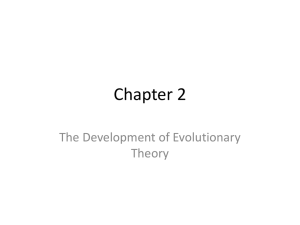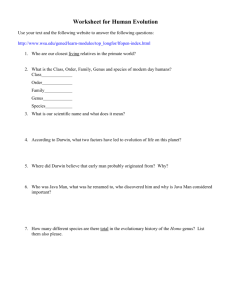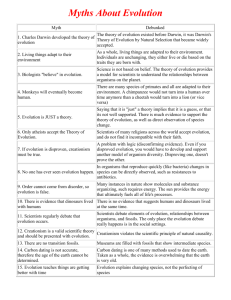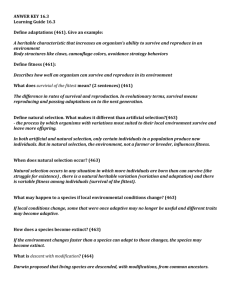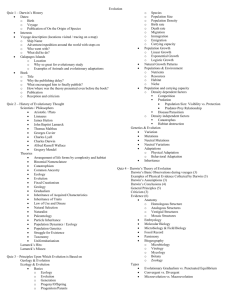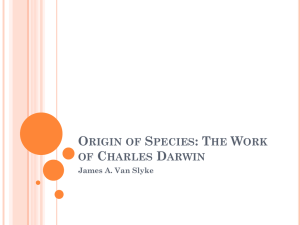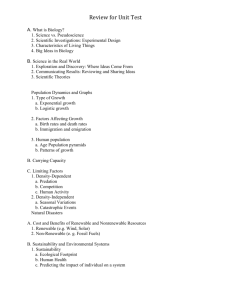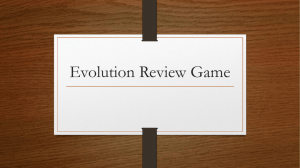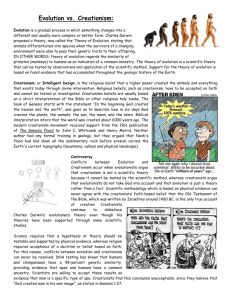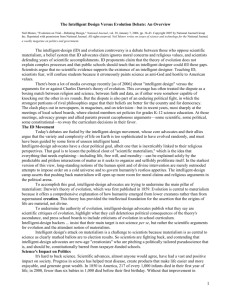From Survival to Love
advertisement
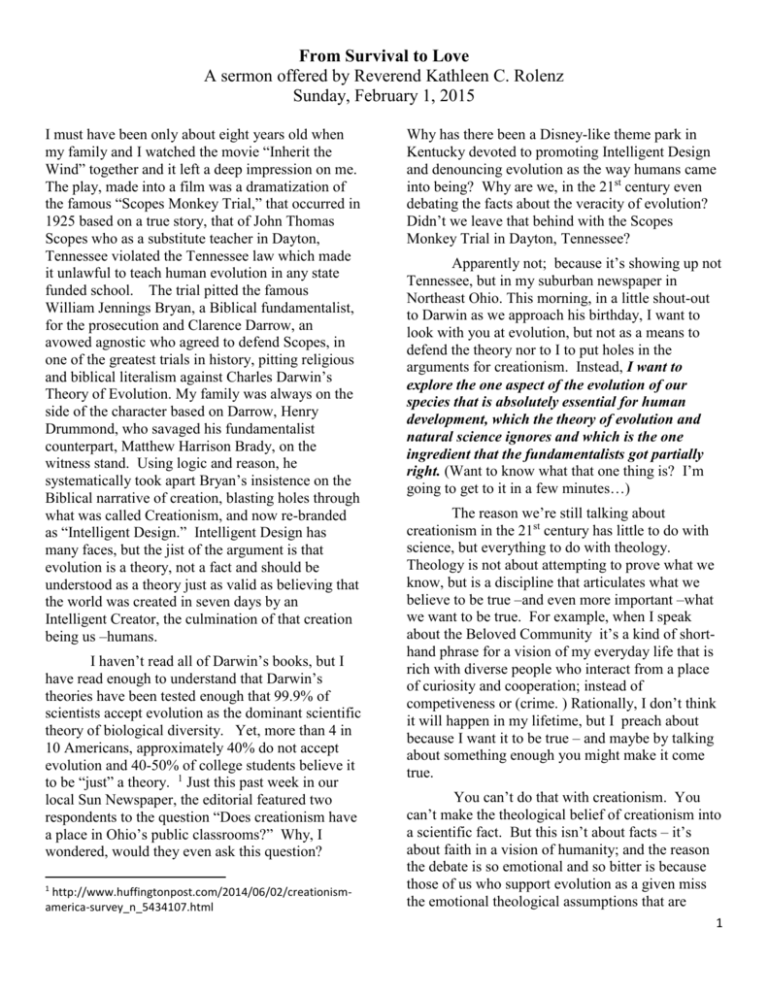
From Survival to Love A sermon offered by Reverend Kathleen C. Rolenz Sunday, February 1, 2015 I must have been only about eight years old when my family and I watched the movie “Inherit the Wind” together and it left a deep impression on me. The play, made into a film was a dramatization of the famous “Scopes Monkey Trial,” that occurred in 1925 based on a true story, that of John Thomas Scopes who as a substitute teacher in Dayton, Tennessee violated the Tennessee law which made it unlawful to teach human evolution in any state funded school. The trial pitted the famous William Jennings Bryan, a Biblical fundamentalist, for the prosecution and Clarence Darrow, an avowed agnostic who agreed to defend Scopes, in one of the greatest trials in history, pitting religious and biblical literalism against Charles Darwin’s Theory of Evolution. My family was always on the side of the character based on Darrow, Henry Drummond, who savaged his fundamentalist counterpart, Matthew Harrison Brady, on the witness stand. Using logic and reason, he systematically took apart Bryan’s insistence on the Biblical narrative of creation, blasting holes through what was called Creationism, and now re-branded as “Intelligent Design.” Intelligent Design has many faces, but the jist of the argument is that evolution is a theory, not a fact and should be understood as a theory just as valid as believing that the world was created in seven days by an Intelligent Creator, the culmination of that creation being us –humans. I haven’t read all of Darwin’s books, but I have read enough to understand that Darwin’s theories have been tested enough that 99.9% of scientists accept evolution as the dominant scientific theory of biological diversity. Yet, more than 4 in 10 Americans, approximately 40% do not accept evolution and 40-50% of college students believe it to be “just” a theory. 1 Just this past week in our local Sun Newspaper, the editorial featured two respondents to the question “Does creationism have a place in Ohio’s public classrooms?” Why, I wondered, would they even ask this question? 1 http://www.huffingtonpost.com/2014/06/02/creationismamerica-survey_n_5434107.html Why has there been a Disney-like theme park in Kentucky devoted to promoting Intelligent Design and denouncing evolution as the way humans came into being? Why are we, in the 21st century even debating the facts about the veracity of evolution? Didn’t we leave that behind with the Scopes Monkey Trial in Dayton, Tennessee? Apparently not; because it’s showing up not Tennessee, but in my suburban newspaper in Northeast Ohio. This morning, in a little shout-out to Darwin as we approach his birthday, I want to look with you at evolution, but not as a means to defend the theory nor to I to put holes in the arguments for creationism. Instead, I want to explore the one aspect of the evolution of our species that is absolutely essential for human development, which the theory of evolution and natural science ignores and which is the one ingredient that the fundamentalists got partially right. (Want to know what that one thing is? I’m going to get to it in a few minutes…) The reason we’re still talking about creationism in the 21st century has little to do with science, but everything to do with theology. Theology is not about attempting to prove what we know, but is a discipline that articulates what we believe to be true –and even more important –what we want to be true. For example, when I speak about the Beloved Community it’s a kind of shorthand phrase for a vision of my everyday life that is rich with diverse people who interact from a place of curiosity and cooperation; instead of competiveness or (crime. ) Rationally, I don’t think it will happen in my lifetime, but I preach about because I want it to be true – and maybe by talking about something enough you might make it come true. You can’t do that with creationism. You can’t make the theological belief of creationism into a scientific fact. But this isn’t about facts – it’s about faith in a vision of humanity; and the reason the debate is so emotional and so bitter is because those of us who support evolution as a given miss the emotional theological assumptions that are 1 underneath the theories of Creationism. Let me try to break this down a little more for us, and to do that, we have to understand what a person who believes in Intelligent Design would have to give up in order to fully embrace the theory of evolution. First – they’d have to give up the literal interpretation of the Bible. It would mean that the story of the Garden of Eden would be nothing more than a fairy tale, and if God wrote the Bible, then why would God make something up that wasn’t true? If you were to say, “Well, the Garden of Eden didn’t happen that way, but what about all the other stories?” Before you know it, they all come tumbling down and you are left holding the apple. Without God, what’s to keep you from just taking a bite out of it? Second, and this is where we start getting into painful theological territory – embracing the theory of evolution eliminates the need for a Creator God who loves and cares for us as a mother would care for a child she birthed. Creationists would argue that evolution cuts the umbilical cord between God and nature and; instead of having a deep connection between creator and creation, we have a savage, unsentimental relationship with nature that is completely indifferent to our concerns or worries as human beings. Finally, perhaps the biggest objection to teaching evolution, as relevant today as it was at the Scopes Monkey Trial or during Darwin’s time, was that evolution degrades values, undermines morals and that if children grow up believing in evolution instead of religious doctrine, they will behave like animals. Does this sound like an outrageous claim? Former Texas Republican Representative Tom DeLay claimed that the Columbine school shootings were caused by the teaching of evolution. DeLay is quoted as stating that "Our school systems teach the children that they are nothing but glorified apes who are evolutionized [sic] out of some primordial soup.” It’s an easy way to dodge larger issues like how two teenage boys were able to get a cache of guns – but that’s another sermon for another time. So, we have two seemingly incompatible belief systems. One – evolution – has been founded on the scientific method, years of observation, refinement and testing and has the backing of some 99.9% of scientists. The other, Creationism or Intelligent Design also claims to have been equally researched and tested and has convinced at least 40% of the population of its validity. What I suspect is so offensive to those who believe in Intelligent Design about Darwin’s theory of evolution is the notable absence of one of the most important, driving forces known to humanity – love. I can hear you thinking now – but evolution is not about love, it’s about science and facts. I agree; but how we think the world should be – that is about theology - that is what we do here in church week after week – think about how the world “should be,” and here is where, as much as I am loathe to admit it, I think the impulse behind intelligent design arises. Evolution does not account for or consider the role of love in how we human beings evolve. I understand that this happens in a different field of science all together - that’s for the psychologists and sociologists to figure out. But, if you base your belief system on a relationship with God, it’s hard to square the brutality of nature with the glory of creation and our place in it. Darwin himself, who became an agnostic Unitarian later in his life, did not try to explain the presence of love in humans as a product of evolutionary science. Instead, he too, looking at the evolutionary process, was taken aback by its ruthless suffering. He once wrote: “what a book a devil’s chaplain might write on the clumsy, wasteful, blunderingly low and horribly cruel works of nature!” How can you account theologically for the adorable male gray langur monkey in India that will slaughter the infants of a female if she birthed them by a rival male? Or cute gerbils killing and eating other offspring; or even the parasitic wasp laying eggs in the soft body of a caterpillar, which then feeds on the caterpillar’s live body until it is consumed? All of these evolutionary adaptations are necessary for a species’ survival and none of them shed light on the most incomprehensible leap of the human heart – to love beyond even the personal mandate for survival. Where Darwin’s theory ends is where theology begins. We begin with the realization that we take responsibility for life not needing to be nasty, brutish and short; that those deemed weaker physically or otherly-abled are worthy of full participation in life. The bodies we have are the 2 product of evolution, as Darwin described; and presumably, we have reached the end – or at least a long pause – in the physical process of evolution. Now, we are in the midst of an evolution revolution – a spiritual revolution that is demanding the ongoing evolution of not just the human mind – but the human spirit. The process of evolution was not for nothing – it is to lead us to the point whereby our hearts and minds are ready to take the next evolutionary step – from survival to love. In order for us to continue evolving as human beings, old forms must die out. Just as Darwin’s theory of survival of the fittest meant that those who were least willing to adapt to change had to die – so do some beliefs, habits of human construction. Because you see, if they don’t die – if we don’t allow some parts of our life to become extinct – we will never evolve into the human beings who carry with us the DNA of divinity as well. This world has to end, my friends. Parts of our world must become extinct. To tell us about it, I’m going to ask rapper and public intellectual Prince Ea to come into the worship service and tell us why he thinks this world should end. Video Reflection – Why this World Should End (4 mins) Sermon – Part II Prince Ea challenges us to look at love in a new way, not romantic love, not insipid love, not the fake air kissy kind of love, but one that is so real and so bottom line that our very survival as a planet and as a people depend on it. So how to go from evolutionary survival – just claiming a place on the planet – struggling to stay on top of the heap – to a being who is capable of a truly evolutionary, revolutionary kind of love? And what does that kind of love look like? What qualities transform us from our basic, biological, animal, aggressive passions into something “divine?” The evolution of love requires not a subduing of passion; but a disciplining of them. A disciplined passion is not a theme that’s going to make it into Hollywood movies. It’s the undisciplined passion that sells tickets on Valentine’s Day – the running off into the sunset with the soul mate you met hours ago on the internet; the hooking up and sleeping around because you’ve decided someone is “hot” regardless if you’re committed or not; passion, like lava flows, will eventually cool and harden. D.H. Lawrence writes “Go deeper than love, for the soul has greater depths, love is like the grass, but the heart is deep wild rock molten, yet dense and permanent…” What we’re looking at today and for the rest of this month as we wonder if love can conquer all is the ways we can move into greater depths – into the deep wild rock of the heart. I submit that there are at least two things that move us from pure survival to mature and lasting love: The first is forgiveness. In an article entitled “From Survival to Love”, the author Sollerder writes: “Forgiveness is specifically a matter of dealing with pain.” 2“Forgiveness is the choice to accept pain inflicted by another and to refuse to return that pain upon the perpetrator. It is a choice to end the cycle of violence and the spread of hurt. It comes at great cost. If someone hurts us and we hurt them back, we feel vindicated. We have, following our evolutionary impulses, reminded them of the cost of meddling with us…but by going through the process of pain, love opens up a new option of finding healing and turning the pain from the agent of evil to the use of good.”3 Forgiveness interrupts the baser aggressions within us; keeps us from eating alive, not our offspring, but our very spirits. It’s a natural instinct to want to hurt someone who has hurt you. But, “let a person know that they have are truly forgiven and a whole lifetime of change may not pay the debt of gratitude…the forgiven is either transformed by the touch of grace, or at the very least, not provoked into any further action by receiving fresh violence.” The second quality of an evolutionary, revolutionary love is surrender. That is completely contradictory to Darwin’s theory of evolution, natural selection and survival of the fittest. Surrender is not something that is supported by evolution because to surrender to another animals’ takeover of your turf is a sure way to die. Yet, in evolution, what happens molecule by molecule is the surrendering of the self to the environment. The environment changes – you change with it. You 2 Sollereder, quoting Elphinstone, whose book she is reviewing. 3 Bethany Sollereder, From Survival to Love; The Christian Century, September 17, 2014, pgs 24 3 adapt to the change and that adaptation changes you. This is something that we do all the time, but it’s harder to see if you live in the same house, perhaps with the same spouse you’ve known for a very long time, but you must change and by so doing surrender your insistence on permanence. The song the band played earlier in the service reminds us of another truth – especially when it comes to love – remember these words from the song “to win you must fight or so they say, but with love things never seem to work out that way; with love you can’t win if love can’t get in and it can’t pierce the heart of a defender, to win in love you must surrender.” asks us to lay down our arms and our weapons? I think singer songwriter Jonathan Richman unwittingly challenged us towards an even higher evolution, when he wrote, ““your armor so strong is strategically wrong, victory this time goes to the tender, to win in love, you must surrender.” Surrender is not a word that we typically use or think of as a spiritual practice. It certainly would not promulgate the species if the animal kingdom simply surrendered to their predators. But we’re not talking about predators here, we’re talking about people – human beings – struggling not just to survive, but to give and receive love – to have one’s heart opened up and become vulnerable…and now you’re asking me to surrender? Surrender what? My power, my will, my ego, my desire to be right, my insistence on having this my own way, my lack of consideration for “the other” the I – the ME – and the MINE – the inability to let the other person be who he or she is instead of what you want them to be or fantasized them being as another reflection of your personality – you surrender those things as part of the revolutionary, evolutionary love. Love is surely as much of the evolution of our spiritual self as dropping a tail and walking upright has been to our biology. Author Bethany Sollereder writes: “The untrasmuted self has had 3.5 billion years of evolutionary training to sharpen its skills of self-preservation, to build its strength, to learn its perilous cunning. This self is not evil, but she is a keen and powerful survivalist…[but] the path of love is a longer, harder road than the simple one of survival called for by evolution. … The bitter raw products of evolution are slowly being brought to transcend evolution itself4” Can you imagine a world in which we evolve past hatred, greed and ignorance? Can you imagine this evolutionary, revolutionary love that 4 Bethany Sollereder, From Survival to Love; The Christian Century, September 17, 2014, pgs 24-25. 4
